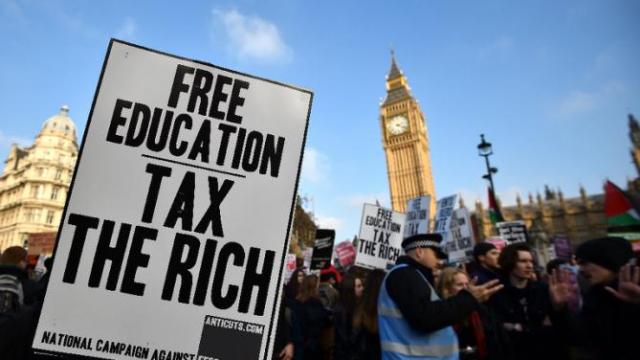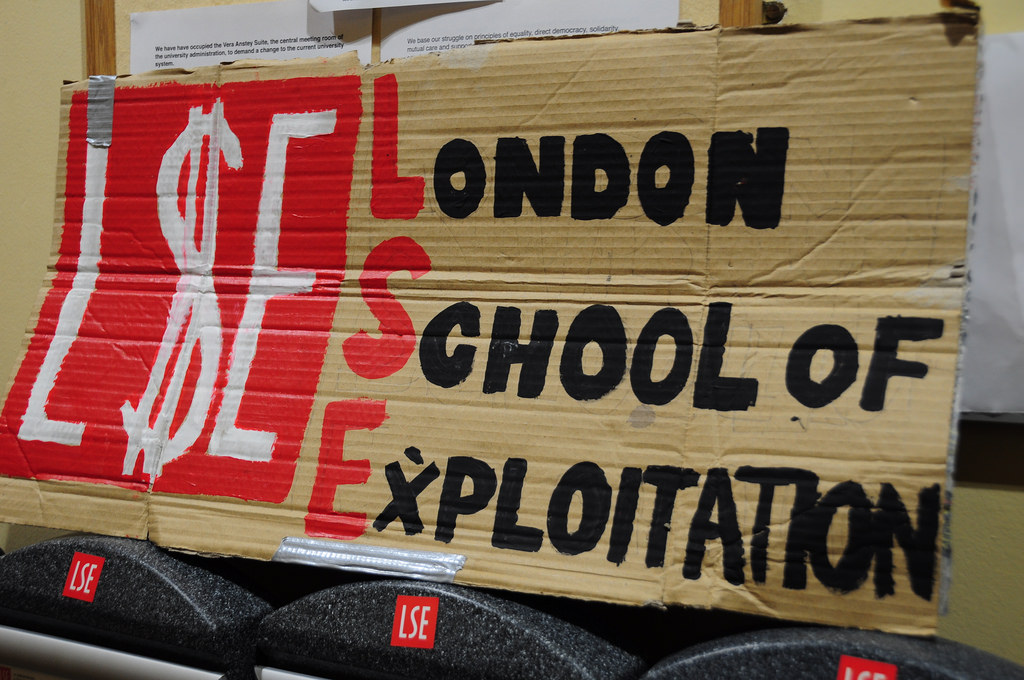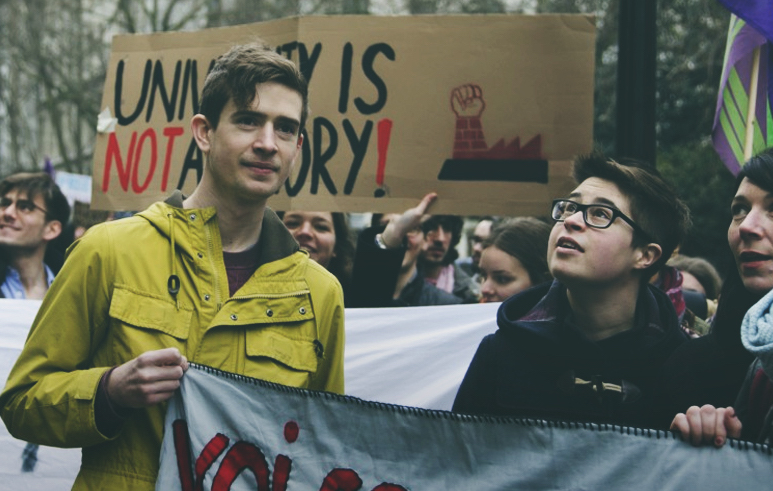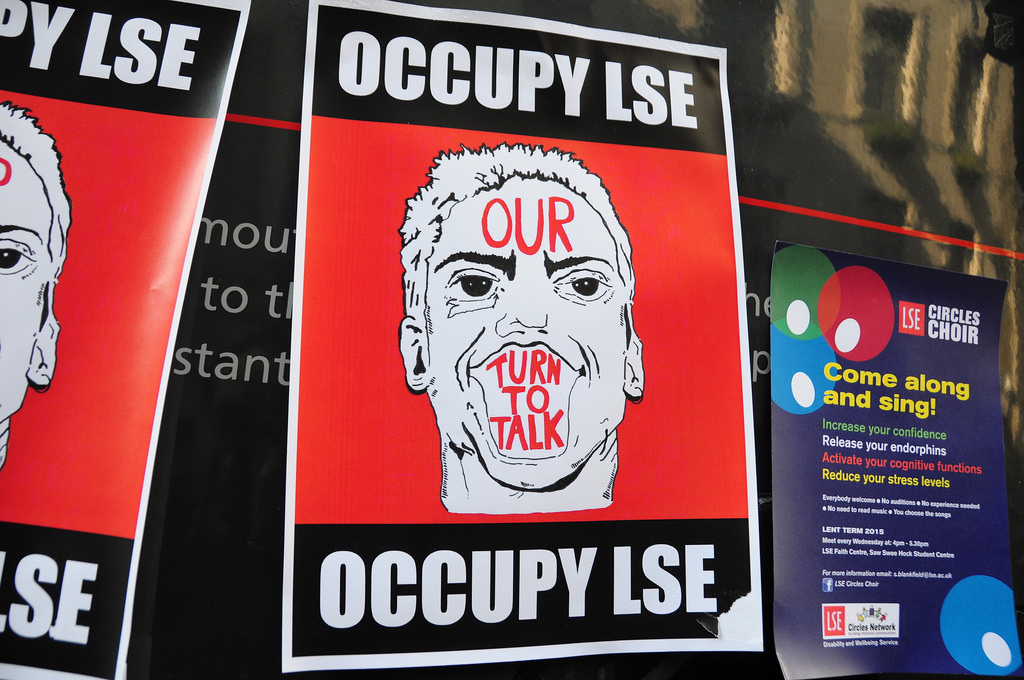
Student occupations are spreading across the U.K. ignited by Occupy LSE, a student-staff takeover that began on March 17 at the London School of Economics, a world famous bastion of neoliberal thinking. So what exactly is going on, and why does it matter?
The Free University of London
“We wanted to create a radical political space at LSE where staff and student could speak freely,” Ben Tippet, a Masters student in development studies, explained.
“We feel the whole university has been depoliticized, with a corporate culture that cares way more about profit than the role of the university in the wider society.”
Taking control over the management’s meeting room, students and staff have transformed the space into what they're calling the "Free University of London," open to all. They have set up a library and are running workshops and debates. Topics include climate change, the neoliberalization of education and workers' rights. Through workshops and a consensus process, hundreds of students and staff have also created a comprehensive set of demands.
Free universally accessible education is Occupy LSE's first demand. They call for management to respect those who work at the university, and enable it to run along democratic lines. They assert that LSE needs to become a space of liberation that challenges institutional racism, sexism and other forms of prejudice.
“We want an education system that is decided through democratic structures by academics and students: one that is critical, political and serves a democratic social functions.” Tippet added. “One of LSE’s main impacts is to pump graduates into the City of London, into the very financial institutions which LSE’s own research explains is destroying the environment, our economy and society.”
The demands also call on the university to divest from fossil fuels – a call that is echoing around universities in Britain, with Glasgow becoming the first in Europe to divest completely. At LSE, the popularity of the divestment call is reflected in a petition gathering hundreds of signatures.
The argument to divest from fossil fuels was made clear, among other places, in a report written by Bob Ward explaining how carbon assets will become stranded once necessary global action is taken to stop catastrophic climate change.
What is ironic is that, so far, LSE hasn't put its money where its mouth is: Bob Ward is the policy and communications director at the Grantham Research Institute on Climate Change and the Environment, which is part of LSE.
The student occupation of LSE is significant: the institution is a key part of Britain’s establishment. But the university's students are not alone in their stand against the neoliberal, oil-invested direction of universities and, more broadly, society.
A New Wave of Student Protest
The day before the LSE occupation, students at Oxford, another keystone in Britain's establishment, also occupied, taking over the Clarendon building and demonstrating against the university's shares of fossil fuels.
The University of Oxford takes funding from oil companies, including Shell, which are largely unpopular with academics and students alike. Shell’s sponsoring of one of academia's most respected institutions revealed to many the increasing influence of “frackademia,” where Big Oil pays for research into industries like fracking – research that no longer deserves to be called science.
Earlier in March, students in Sheffield occupied Nick Clegg’s local office under the banner of free education. Nick Clegg, Deputy Prime Minister and leader of the Liberal Democrats, famously abandoned his party's election pledge to scrap tuition fees. Instead, when the Liberal Democrats came to government, those costs tripled.
The LSE occupation has been followed by students reclaiming space at the University of the Arts (UAL), Kings College and Goldsmiths, all universities in London.
“When they cut back on foundation, we go into occupation!” chanted students during a lively protest that started at Occupy LSE, with over a hundred students marching to UAL and King’s campuses in different parts of central London.
“UAL occupied when we heard the foundation course," which provides working class students a way into education, "will be cut next year," explained Peter Smith, a third year student at UAL. "This is a cut of 800 places that offers a gateway for students from state schools."
With the foundation cuts, UAL has also fired staff members. Smith said this was done without any consultation. The art university occupation demands that the foundation courses and sacked academics be reinstated, and that all cuts at UAL be repealed. In ethos, it also supports the call for universal free education.
Smith explained that UAL management has shifted the institution's focus. “The University no longer recognizes that some people want education to create a better society, not just to get a better job,” he said.
Anti-corporate sentiments echo throughout this new wave of Britain’s student movement, driven by the idea that a healthy society needs critical education to push progressive social change. The movement asserts that the current university system only replicates the systemic failures of neoliberalism.
The Red Square has been adopted as the movement’s symbol. The red piece of material, worn with a safety pin, comes from Quebec, where students wore the square during 2012 protests that reversed the onset of tuition fees, university privatization and neoliberal reforms.
Inspiration for the movement comes from Amsterdam as well, where Dutch students occupied their administration department earlier this month and created the Free University of Amsterdam.
The way that neoliberalism is privatizing education globally has galvanized an increasingly international Red Square movement. The "ed Squares Everywhere website shows a growing list of international groups working in solidarity, rippling out from the Netherlands and spinning off new occupations in the U.K., Canada and Macedonia.
Is this a Student Spring in the making? It may be too early to call, but the onset of neoliberal reforms across academia seems to have set in motion an international student movement with a coherence, and a passion, we have not yet seen.
3 WAYS TO SHOW YOUR SUPPORT
- Log in to post comments

















